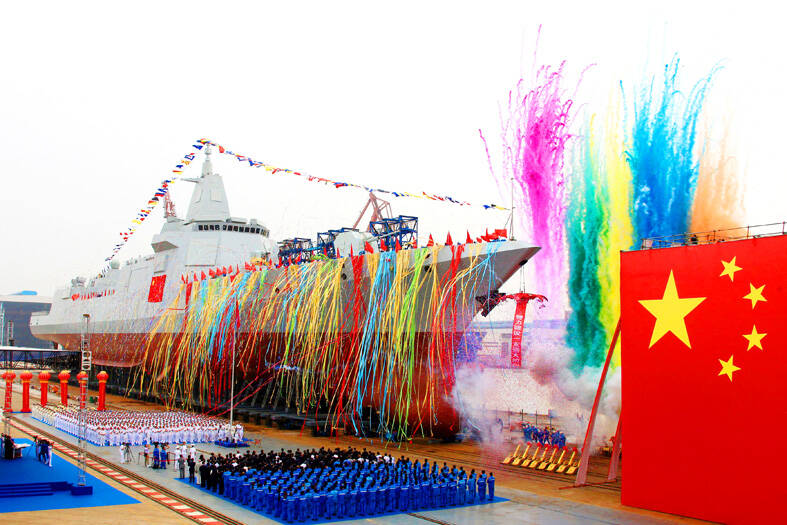China yesterday launched a new amphibious assault ship capable of launching fighter jets and designed to strengthen the navy’s combat ability in distant seas.
The Sichuan, the first ship of the Type 076 class, is China’s largest such ship yet, displacing 40,000 tonnes and equipped with an electromagnetic catapult which allows fighter jets to launch directly off its deck, Xinhua news agency reported.
The ship is designed to launch ground troops in landing craft and provide them with air support.

Photo: Reuters
Developed by Chinese researchers, it is also equipped with “arrestor” technology, which allows fighter jets to land on its deck.
China’s first amphibious assault ships, the Type 075 class, were launched in 2019.
China’s People’s Liberation Army Navy has been working on modernizing its forces for more than a decade, with the aim of being able to operate globally rather than being restricted to waters near China. China first managed to launch fighter jets with the new electromagnetic technology on its indigenously made aircraft carrier, the Fujian, which launched two years ago.
Chinese military expert Song Zhongping (宋忠平) compared the Sichuan to a “light aircraft carrier,” the Global Times reported.
The ship is to undergo further testing, including sea trials.
China has the largest navy in the world and is consistently trying to upgrade its fleet. Researchers have said that it is working on designing a nuclear-powered aircraft carrier, which would allow it to deploy its ships in distant waters without needing a base to refuel.
The US navy has 11 nuclear-powered aircraft carriers, allowing it to keep multiple strike groups deployed around the world at all times, including in the Asia-Pacific region.

The US government has signed defense cooperation agreements with Japan and the Philippines to boost the deterrence capabilities of countries in the first island chain, a report by the National Security Bureau (NSB) showed. The main countries on the first island chain include the two nations and Taiwan. The bureau is to present the report at a meeting of the legislature’s Foreign Affairs and National Defense Committee tomorrow. The US military has deployed Typhon missile systems to Japan’s Yamaguchi Prefecture and Zambales province in the Philippines during their joint military exercises. It has also installed NMESIS anti-ship systems in Japan’s Okinawa

‘WIN-WIN’: The Philippines, and central and eastern European countries are important potential drone cooperation partners, Minister of Foreign Affairs Lin Chia-lung said Minister of Foreign Affairs Lin Chia-lung (林佳龍) in an interview published yesterday confirmed that there are joint ventures between Taiwan and Poland in the drone industry. Lin made the remark in an exclusive interview with the Chinese-language Liberty Times (the Taipei Times’ sister paper). The government-backed Taiwan Excellence Drone International Business Opportunities Alliance and the Polish Chamber of Unmanned Systems on Wednesday last week signed a memorandum of understanding in Poland to develop a “non-China” supply chain for drones and work together on key technologies. Asked if Taiwan prioritized Poland among central and eastern European countries in drone collaboration, Lin

The Chien Feng IV (勁蜂, Mighty Hornet) loitering munition is on track to enter flight tests next month in connection with potential adoption by Taiwanese and US armed forces, a government source said yesterday. The kamikaze drone, which boasts a range of 1,000km, debuted at the Taipei Aerospace and Defense Technology Exhibition in September, the official said on condition of anonymity. The Chungshan Institute of Science and Technology and US-based Kratos Defense jointly developed the platform by leveraging the engine and airframe of the latter’s MQM-178 Firejet target drone, they said. The uncrewed aerial vehicle is designed to utilize an artificial intelligence computer

Renewed border fighting between Thailand and Cambodia showed no signs of abating yesterday, leaving hundreds of thousands of displaced people in both countries living in strained conditions as more flooded into temporary shelters. Reporters on the Thai side of the border heard sounds of outgoing, indirect fire yesterday. About 400,000 people have been evacuated from affected areas in Thailand and about 700 schools closed while fighting was ongoing in four border provinces, said Thai Rear Admiral Surasant Kongsiri, a spokesman for the military. Cambodia evacuated more than 127,000 villagers and closed hundreds of schools, the Thai Ministry of Defense said. Thailand’s military announced that